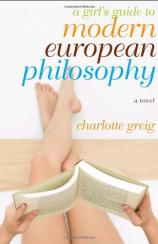Reading Group Guide
Discussion Questions
A Girl’s Guide to Modern European Philosophy

1. The book begins as Susannah wakes up screaming. At this point, we have no idea why. What do we find out about her inner life as the book progresses?
2. What role do dreams play in the book? Reference the recurring image on pages 64–65 of being “in a white car traveling along a black road.”
3. On page 16, Susannah devises a way to walk all the way through a student pub without “feeling like an idiot.” She seems self-conscious and insecure. Does she become more confident as the story continues? If so, why?
4. How do Jason and Rob fulfill different needs for Susannah?
5. Compare the university environment in which Susannah studies with the company she keeps outside of school. Specifically, compare the party at Rob’s house on page 26 with the scene in the London bar on page 47. Does social class play a role? Or is it age? Does Susannah seem comfortable in either setting?
6. On page 42, a tarot card reader on the train deals Susannah an illustrated card of a jester with the words The Fool written on the bottom. What does this suggest about Susannah and her peers?
7. Susannah doesn’t divulge too much about her family. Discuss what you know about her father, her mother, and her hometown.
8. Do you think the death of Susannah’s father subconsciously influences her decisions as regards her love life?
9. How does Susannah view the different settings of her life: the student housing on campus, Jason’s flat in London, her mother’s home in Swansea?
10. What do you make of Jason’s reaction to her pregnancy? Do you think his rejection of her is forgivable? Compare this with Rob’s reaction.
11. What roles do Susannah’s friends Cassie and Fiona play in the book?
12. “Susannah turns to the great male philosophers for guidance, in the absence of help from her parents and teachers.” Is this statement true, do you think? 13. The part titles of the book mimic the curriculum for an introductory philosophy course. What do you think of this device?
14. Nietzsche is discussed in the first section, under “Short Loan,” implying that his philosophy is not very useful; Heidegger under “Reference” (more useful); and Kierkegaard under “Long Loan” (very useful). Do you agree?
15. What does Susannah learn from her discussion with Søren Kierkegaard?
16. Do you think Susannah makes the right decision in the end? Is there a right decision?
17. This novel takes place in 1974. Do you think attitudes have changed since this time?
18. The story is set in a seaside town in Britain. Do the characters behave differently than how they would in the U.S.?
19. Is philosophy useful for making life decisions? Would Susannah have done better to visit a student counselor?
20. Did you learn anything about philosophy from reading this novel?
A Girl’s Guide to Modern European Philosophy
- Publication Date: May 12, 2009
- Paperback: 275 pages
- Publisher: Other Press
- ISBN-10: 1590513177
- ISBN-13: 9781590513170







